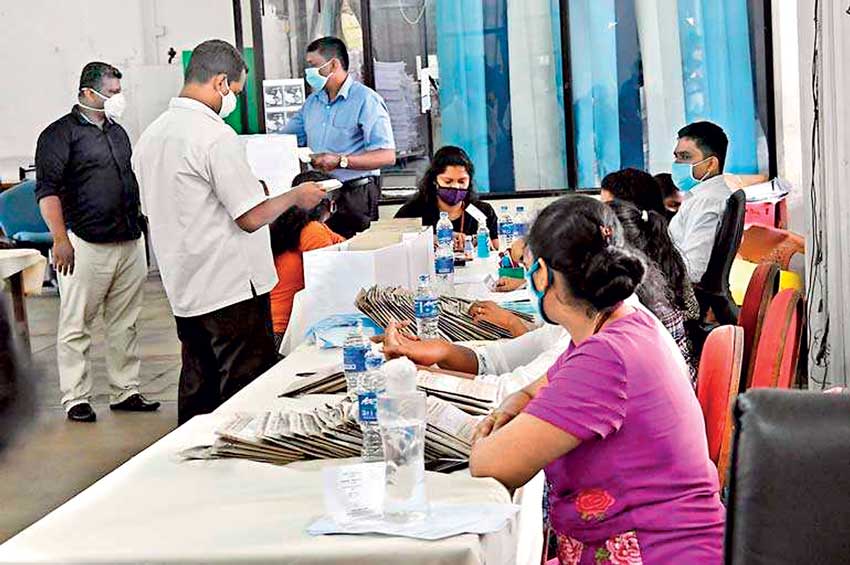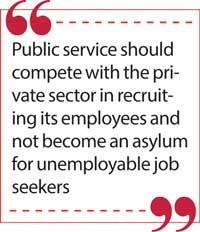Sunday Feb 15, 2026
Sunday Feb 15, 2026
Tuesday, 30 November 2021 01:44 - - {{hitsCtrl.values.hits}}

From a ratio of one public servant to every 113 people at the time of independence, public service has been bloated to a ratio of one for every 13. While office work is rapidly becoming computerised and the concept of an office within an enclosed space itself becoming redundant, employing millions of staff at public expense to maintain files and papers is a modern oddity
“The public sector has expanded so rapidly that they have become an unbearable burden. We must honestly accept, that this public sector is a burden to the country,” said Finance Minister Basil Rajapaksa. On this point he was 100% right. But how did this come about and how to make it slim and efficient are questions the Minister did not care to answer. 
He made his comments while selling his maiden Budget to a disgruntled public, which may not be the proper place to discuss such a major structural issue. However, the writing is on the wall. Either prune the public service, make it more productive and save Government revenue or raise more taxes or beg borrow or steal to pay for this army of file pushers.
From a ratio of one public servant to every 113 people at the time of independence, public service has been bloated to a ratio of one for every 13. While office work is rapidly becoming computerised and the concept of an office within an enclosed space itself becoming redundant, employing millions of staff at public expense to maintain files and papers is a modern oddity.
Official figures show that in 2020, almost 1.5 million State workers took home 86.47% of total tax revenue. The Minister’s proposal to extend the retirement age and not to entertain any demand for salary increase from one year only postpones the day of reckoning to the Treasury. With rising inflation, real income of salaried officials is falling by the day.
Nearly one million public servants have already announced to go on strike shortly. Their demand is understandable, but what could a bankrupt Treasury do? Public service imposes a heavy dependency burden on the Treasury. How to reduce this burden?
There is an urgent need for a radical overhaul of the system of recruitment to public service, and that overhaul should be part of a wider reform agenda of the country’s education system. Basically, it was the exigencies of populist politics and not the need for economic development that created this dependency burden. 
When the Treasury was fairly resourceful in the 1950s and 1960s, politicians exploited public service employment to build up their vote banks. That tradition continued as the economy declined and the Treasury started losing its financial resilience in the seventies and after. In fact, there was a time when parliamentarians were given quotas of jobs in public service to be offered to their supporters.
Several parliamentarians used those quotas to make money. Corruption thus entered and became a plague in the public sector. At one stage, even the so-called socialist policy of nationalising the commanding heights of the economy like public transport for example was intended to provide jobs for the boys. There was a time when there were one driver and two conductors in each of the CTB buses.
On the education side, even SWRD’s Sinhala Only Bill followed by the introduction of swabasha education from kindergarten to university were short cut remedies to provide employment to a rising generation of Sinhala youth. There is nothing inherently wrong in swabasha education. But the progressive removal of English from educational curriculum led to a rapid decline in the standard of education.
At the same time, an increase in the number of State universities produced hordes of unemployable graduates who when passed out had no prospect of gaining employment in the competitive private sector. Equipped with knowledge in soft subjects like Sinhala, Tamil, Pali, Sanskrit and other social sciences, university graduates suffered from skill mismatch and public service became the last resort for those job seekers.
With subtle and sometime open discrimination against minorities, more than 92% of employees in public service today are Sinhalese. This is a burden deliberately created by politicians without realising its consequences in the long run. The chickens have finally come home to roost. A bankrupt Treasury is finding it unbearable to carry this burden.
Free education was introduced to increase the literacy rate and produce a skilled workforce. That was a phenomenal success and Sri Lanka by 1970s achieved the highest literacy rate in Asia. However, free education does not mean that the Government also guarantees employment to all those who pass out of its education stream. This was never explained to the people by the politicians. Instead, they promise Government jobs at every election.
Didn’t President Gotabaya Rajapaksa recently hire 53,000 graduates in the State sector and appoint a Multi-Purpose Task Force to hire another 100,000 Grade 8 qualified in order to reduce poverty? A Government’s task is to develop the economy to create employment opportunities for different levels of skills and training.
The State should compete with the private sector to hire its employees with appropriate remuneration packages as economies of East Asia and Singapore had done. Instead, when politicians appoint public sector employees based not on merit but on political grounds, the deserving have no choice but to leave the country. That explains Sri Lanka’s brain drain. How to develop such an economy is a subject for another discussion.
It is a proven fact that as levels of education increases from primary, to secondary and tertiary, private benefits overtake social benefits. Therefore, employment of the qualified, skilled and trained should be sorted out by the market and not by the Government. Employers must have flexibility to hire and fire and employees must enjoy some level of job security.
Flexicurity is what is needed in the job market and the economic structure should get attuned to that principle. Public service should compete with the private sector in recruiting its employees and not become an asylum for unemployable job seekers.
Neither the Government nor the Opposition seem to have any agenda to introduce reforms along this line in the education system as well as in the job market. Without those reforms, a bankrupt Treasury has no option but to carry the public sector dependency burden.
(The writer is attached to the School of Business and Governance, Murdoch University, Western Australia.)